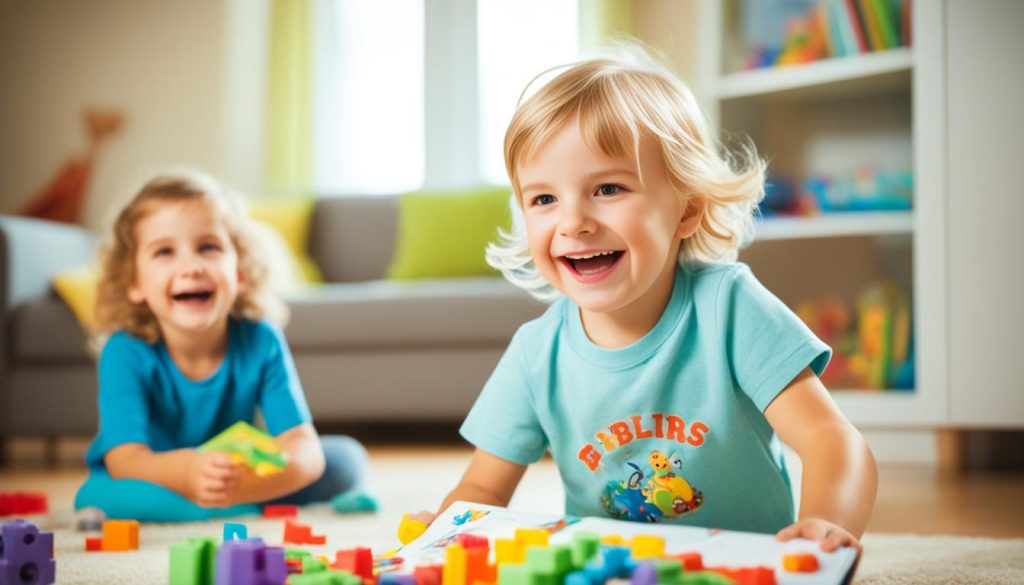Imagine the sound of laughter filling the room, your children playing together without fighting, and sharing toys. This is what every parent dreams of. But, sibling rivalry is a common challenge in parenting. It doesn’t have to be hard to handle, though.
Recent data shows that many parents find their kids fighting often very troubling. They feel they can’t stop it. That’s where good discipline and a peaceful family life help.
Susan Albers, PsyD, says sibling rivalry is more than just fighting over toys. It comes from deeper issues like birth order and wanting more attention from parents. Teaching kids to express feelings, solve problems, and get rewards for good behavior can help.
By setting clear rules and teaching empathy, you can turn rivalry into growth and stronger family ties.
Key Takeaways
- Most parents view siblings fighting as a major parenting concern.
- Parental intervention in fights often escalates conflicts.
- Individual attention for each child can significantly reduce rivalry.
- Setting boundaries and personal space helps lessen conflicts.
- Teaching children empathy and problem-solving skills aids in peaceful conflict resolution.
Understanding Sibling Rivalry
Dealing with sibling rivalry is a big challenge for many families. It’s a common issue that happens when there are more than two kids in a family. It’s important to understand how it affects family life to manage it better.
What Is Sibling Rivalry?
Sibling rivalry means constant fighting and competition between siblings. It can happen between kids who are close in age or have a big age difference. Kids often fight over things like toys, attention, or even just to get a reaction from their parents.
This kind of fighting is a big part of how kids learn to interact with each other. It helps them develop important social skills.

Kids fight for many reasons, like to get attention, feel important, or just to have fun. But parents often want their kids to be kind, share, and work together. This can lead to frustration and the need for new ways to handle the situation.
The Psychology Behind Sibling Rivalry
There are deep reasons why siblings fight, like wanting more attention from parents. Being the first child can make things harder for them. The order in which kids are born affects how they get along and behave with each other.
Having siblings close in age means they spend more time together, which can lead to more fights. But having a big age gap might make them less likely to compete with each other.
How parents handle sibling fights can be shaped by their own childhood experiences. If siblings are very different, it can change how parents treat them and how they interact with each other. This can make it harder for some kids to get along.
Even though fighting between siblings is normal, it can be fixed. Helping each child learn how to get along with others can make home life better for everyone.
Common Causes of Sibling Rivalry
Sibling rivalry often comes from jealousy and competition. Kids grow at different rates, leading to different needs and behaviors. This can cause fights over who gets more attention from parents. Knowing these reasons is key to handling sibling jealousy well.

Jealousy and Competition
Jealousy happens when one kid feels another gets more praise or attention. This feeling gets worse during big changes like moving or getting a new sibling. Young kids, especially those under 4 or with big age gaps, feel it the most. Catching these feelings early can help reduce jealousy and make family life better.
Developmental Stages and Differences
Kids go through many stages, each with its own behaviors and needs. These developmental differences can cause fights. For example, a toddler needs constant watching but a bigger kid wants to be more independent. Knowing these stages helps parents find ways to lessen rivalry and support each child’s growth.
Need for Parental Attention
Kids often fight over who gets their parents’ attention. This need for focus and love can lead to arguments. Spending special time with each child, just 10-15 minutes a day, can really help. By giving each child the attention they need, parents can lessen jealousy and help siblings get along better.
| Causes | Details |
|---|---|
| Jealousy and Competition | Children feel envious when one sibling receives more praise or attention, especially during significant life changes. |
| Developmental Stages and Differences | Different growth stages lead to varying needs and behaviors, often causing misunderstandings and conflicts. |
| Need for Parental Attention | Children compete for parental focus and affection, causing rivalry; spending dedicated time with each child helps mitigate this. |
Positive Parenting Strategies
Using positive parenting strategies helps create a caring and peaceful home. These methods focus on teaching important family values and empathy. They also make the home a place of respect and support. Here are some easy ways to start:
Setting Clear Family Rules
It’s important to have clear rules in a family. About 60% of kids in the U.S. feel close to their parents because of consistent and positive interaction. Clear rules teach kids what’s expected and why, helping them manage their feelings and actions.
This means saying no to mean words and solving problems by talking. It’s about setting limits and showing why they’re important.

Encouraging Empathy and Kindness
Teaching kids to be empathetic is key in positive parenting. You can show them kindness by being kind yourself and doing activities together. Studies show that emotional coaching can really help kids behave better and feel happier.
It’s also important to let kids talk about their feelings and listen to them. This can reduce fights and teach kids to respect each other. By doing this, you’re teaching them important values like respect and support.
It’s also vital to know what each child needs. Letting them lead in play can make your bond stronger and boost their confidence. Research shows that supportive parenting leads to better school performance and fewer problems. By teaching empathy and how to handle challenges, you help them grow emotionally and develop well.
Creating an Environment for Cooperation
Creating a cooperative family atmosphere starts with parents being good role models. They should show how to communicate well and treat others with respect. This helps kids learn these important skills.

It’s important to avoid making siblings compete with each other. This can lead to feeling bad and fighting. Instead, celebrate what makes each child special and encourage them to work together.
Children are more likely to listen when asked nicely, not told what to do. This can make them more willing to help out. It also helps build a respectful relationship with everyone in the family.
When both parents work together in raising their kids, it makes a big difference. They need to trust each other and talk well. This means they should agree on how to discipline, what time things happen, and how to make decisions together.
| Key Factors | Details |
|---|---|
| Effective Communication | Involves active listening, empathy, and understanding each other’s perspectives |
| Trust Building | Requires respecting boundaries, reliability, and accountability |
| Celebrating Individuality | Avoids competition and comparison among siblings, focusing on unique traits |
| Clear Instructions | Giving one instruction at a time increases the likelihood of cooperation |
| Daily Routines | Establishing routines aids in task completion and encouraging cooperation |
It’s key to use positive words and set clear rules in the family. When you give clear, positive instructions and let kids choose, they feel more in control. This makes them more likely to help out. Adding praise and encouragement for good behavior helps too. Daily routines help finish tasks and teach kids to work together better.
Building a cooperative family takes time and effort, with being a good role model being key. By using these strategies, you help create a place where working together comes naturally for your family.
Effective Discipline Strategies for Sibling Rivalry
Managing sibling rivalry needs a mix of staying calm, handling discipline privately, and giving constructive feedback. These methods help solve problems now and teach kids how to settle disputes later.
Staying Calm and Controlled
Staying composed in conflicts is a top effective discipline strategy. Most parents deal with sibling rivalry, and staying calm helps ease the tension. Being proactive, tackling issues early, works better than reacting late.
Enough sleep is key, as it helps kids manage their emotions better. Encouraging kids to settle their own disputes can also cut down on fights. Not getting involved in small squabbles helps kids learn to solve problems on their own.
Private Discipline and Constructive Feedback
It’s important to discipline kids privately to avoid shaming them in front of others. This way, the focus is on giving meaningful feedback. Instead of making kids say sorry, ask them how they can fix the issue.
Reading books like “How to Talk so Kids Will Listen: How to Listen so Kids Will Talk,” has helped many parents give constructive feedback better. This approach reduces rivalry.
Teaching kids to ask permission before sharing things has lowered arguments. Spending one-on-one time with each child boosts teamwork and lessens rivalry. Responding calmly to fights shows kids it’s safe to solve problems peacefully.
Promoting Individuality Among Siblings
Promoting individuality among siblings is key to less tension and rivalry. It’s important to make each child feel valued for who they are. Since siblings share traits only about 20 percent of the time, as NPR reports, it shows how vital it is to see their unique differences.
Avoiding Comparisons
It’s crucial to avoid comparing siblings to prevent feelings of resentment and competition. Research from the 1980s by Robert Plomin found that siblings are not much more alike than any two strangers in personality. By focusing on their unique strengths, rather than comparing them, helps build a strong sense of self-worth.
Celebrating Each Child’s Unique Traits
Celebrating each child’s unique strengths helps them value their own abilities and contributions. Spending one-on-one time with each child shows their importance. Dr. Becky notes that treating children the same can lead to more conflict, showing the importance of celebrating their individuality. Instead of focusing on fairness, we should recognize and value what makes each child special.
| Key Concept | Benefit |
|---|---|
| Recognizing Individuality | Reduces tension and rivalry |
| Avoiding Sibling Comparisons | Prevents feelings of resentment and competition |
| Celebrating Unique Strengths | Fosters healthy self-worth |
Modeling Healthy Conflict Resolution
Parents are key in teaching their kids how to solve conflicts in a healthy way. By showing how to deal with disagreements, you keep your home peaceful. You also teach your kids important skills for life.
Using “I Feel” Statements
Using “I feel” statements is a great way to solve conflicts. It lets you share how you feel without blaming others. Saying “I feel upset when…” makes it clear and helps avoid making things worse.
Active Listening Techniques
Active listening is also crucial in family conflicts. It means really paying attention and caring about what others say. Actions like nodding and keeping eye contact help improve communication and prevent mistakes.
When you use these methods, your kids learn how to argue in a respectful way. They see the value of talking openly and understanding others. This not only strengthens your bond but also prepares your kids for their future relationships.
Building a Routine to Minimize Conflict
Creating structured routines and setting clear expectations can really help reduce sibling rivalry. It makes the home environment more harmonious. By having consistent daily activities and family meetings, kids learn their roles and enjoy a predictable life.
Setting Schedules and Expectations
Setting clear schedules is a great way to cut down on sibling fights. It means making routines and letting kids help plan them. When they know what’s coming, they feel less stressed and more secure.
Incorporating Daily Rituals
Doing things together, like eating meals, going to bed, and having family meetings, brings siblings closer. These rituals help strengthen family ties and offer chances for positive talks.
Encouraging Sibling Bonding Activities
Promoting sibling bonding is key to building strong relationships between siblings. Studies show that supporting sibling relationships is vital for a supportive family atmosphere. Activities like family game nights and shared projects can boost these bonds by promoting teamwork and creating happy memories.
Family Game Nights
Family game nights are a great way to bring siblings together. These nights are more than just games; they help siblings interact positively and learn about teamwork. Experts in family counseling say these activities improve communication, forgiveness, and conflict resolution among siblings.
Setting aside time for family game nights creates a routine that protects against stress. Many games, like “Guess Who” or sensory play, can be enjoyed by siblings of all ages. These activities are fun and teach important life skills.
Surveys show that these family rituals are crucial for building strong sibling relationships.
Shared Interests and Joint Projects
Encouraging siblings to work on projects together is another good strategy. It could be a school project, a craft, or helping with chores. These activities make siblings work together towards common goals, deepening their bond.
Sharing interests lets them spend quality time together, away from technology. Reports suggest that open communication and being vulnerable in these activities create a loving atmosphere.
Having older siblings mentor or advise younger ones can also help. This approach improves the younger sibling’s skills and builds responsibility in the older one. Data shows that time spent on these activities can boost academic performance, showing the benefits of working together.
In conclusion, family game nights and shared projects have two main benefits. They strengthen sibling bonds and create a supportive family atmosphere, helping to reduce stress.
Signs You May Need Professional Help
It’s crucial to know when you need help with sibling rivalry to keep your kids’ mental health strong. Signs like emotional distress and physical fights between siblings can mean there are deeper issues. Here are some signs that you might need professional help.
Persistent Emotional Distress
If your child often feels very upset and it doesn’t go away, you might need expert advice. Look out for signs like anxiety, being easily annoyed, or losing interest in fun activities. These could mean it’s time to get help for sibling rivalry. Also, watch for clinginess, trouble sleeping, and other signs of anxiety.
Episodes of Physical Aggression
Seeing your kids fight physically is a big red flag. Hitting, biting, or other violent acts are serious and need quick action. They can make your home unsafe and harm your kids’ mental health. A professional can offer ways to lessen physical fights between siblings.
Impact on Children’s Mental Health
If sibling rivalry is hurting your child’s mental health, it’s time for professional help. Look out for signs like depression, avoiding friends, and acting out. Stress, too much worry, and trouble in school or at home are also warning signs. Getting help early can stop these problems from getting worse and teach your kids how to handle them.
Parenting and Raising Kids
Raising kids who are well-adjusted and kind takes a lot of effort. Parents need to create a caring environment that helps with their mental health and growth.
A study found that praising kids for their achievements boosts their self-esteem. This is better than criticizing them or comparing them to others. It helps build self-esteem in children by making them feel valued.
Supporting child mental health means being consistent with discipline. A survey showed that kids do better with clear rules and consequences. This helps them become more independent and teaches them self-control, which is important for their growth.
Spending quality time with your kids is key to good parenting. Research says that things like family meals and projects together help improve the parent-child bond. These activities are good for their mental and emotional health.
Parents should act as good role models. Studies show that kids copy what they see in their parents. Showing respect, kindness, and honesty helps build self-esteem in children and helps them become well-rounded.
Good communication is vital in parenting. Talking openly, sharing feelings, and letting kids help with decisions makes them understand better and cooperate more. This kind of talk is important for their growth and for a supportive family life.
Here are some main points from recent research on parenting:
| Area of Focus | Key Findings | Impact |
|---|---|---|
| Praise and Accomplishments | Children who receive praise develop higher self-esteem. | Improved self-worth and confidence. |
| Consistent Discipline | Consistent rules and consequences aid in understanding boundaries. | Enhanced self-control and independence. |
| Quality Time | Quality time reduces misbehavior and improves relationships. | Positive parent-child connections. |
| Role Modeling | Children mimic parent behaviors. | Development of respect, kindness, and honesty. |
| Effective Communication | Open dialogue leads to better understanding and cooperation. | Achievement of developmental milestones. |
These strategies show how important thoughtful parenting is. By using positive reinforcement, spending quality time together, and being consistent, parents can help their kids grow and become independent.
Conclusion
Dealing with sibling rivalry is a big part of being a good parent. It needs a careful and steady plan. By setting clear rules, teaching empathy, and encouraging each child to be themselves, we help create a respectful family life. These steps not only help manage tantrums but also boost creativity and support learning in kids.
Parents are key in setting routines and discipline, which helps lower fights and builds a strong bond with their kids. Research shows many parents focus on education and teaching good values. This shows parents want to raise kids who are emotionally strong and well-rounded.
Also, letting each child be their own person and celebrating their special qualities can lessen jealousy and competition. About 14% of parents believe in promoting independence and choice, and 16% value emotional closeness. This balanced way helps kids become kind and respectful. In short, having clear rules, solving conflicts well, and getting help when needed gives kids the tools they need for success and creativity.
FAQ
What Is Sibling Rivalry?
What are the Psychological Causes Behind Sibling Rivalry?
How Do Jealousy and Competition Affect Sibling Rivalry?
How Do Developmental Stages and Differences Impact Sibling Rivalry?
Why is Parental Attention Important in Managing Sibling Rivalry?
How Can Positive Parenting Strategies Help Address Sibling Rivalry?
What Are Effective Ways to Encourage Cooperation Among Siblings?
How Can Parents Stay Calm and Controlled During Sibling Disputes?
Why Is Avoiding Comparisons Important in Reducing Sibling Rivalry?
How Can Parents Use “I Feel” Statements to Model Healthy Conflict Resolution?
How Can Building Structured Routines Minimize Sibling Conflict?
What Are Some Sibling Bonding Activities to Encourage Positive Relationships?
When Should Parents Seek Professional Help for Sibling Rivalry?
This post contains affiliate links. If you click on a link and make a purchase, I may earn a small commission — at no extra cost to you. Thank you for supporting this blog and helping me keep the patterns free! Read the full Affiliate Disclosure & Transparency.
